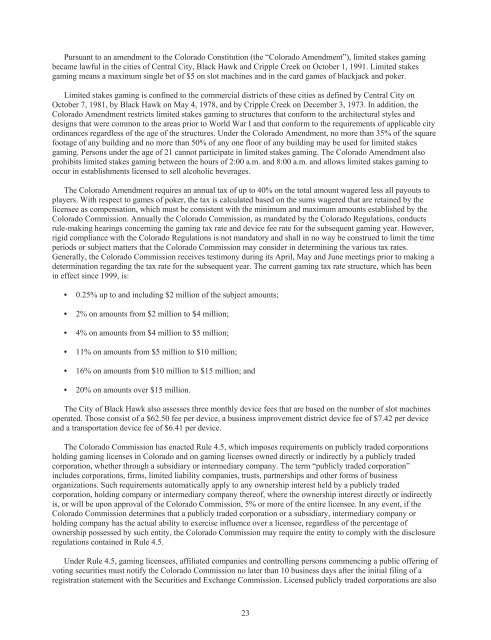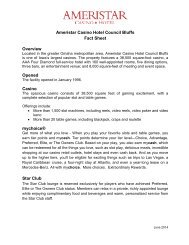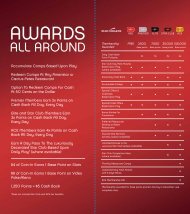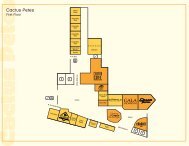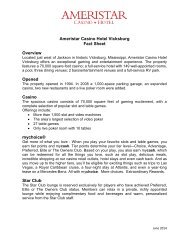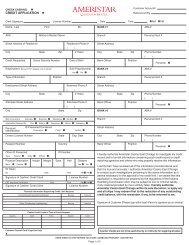2007 Annual Report - Ameristar Casinos, Inc.
2007 Annual Report - Ameristar Casinos, Inc.
2007 Annual Report - Ameristar Casinos, Inc.
You also want an ePaper? Increase the reach of your titles
YUMPU automatically turns print PDFs into web optimized ePapers that Google loves.
Pursuant to an amendment to the Colorado Constitution (the “Colorado Amendment”), limited stakes gamingbecame lawful in the cities of Central City, Black Hawk and Cripple Creek on October 1, 1991. Limited stakesgaming means a maximum single bet of $5 on slot machines and in the card games of blackjack and poker.Limited stakes gaming is confined to the commercial districts of these cities as defined by Central City onOctober 7, 1981, by Black Hawk on May 4, 1978, and by Cripple Creek on December 3, 1973. In addition, theColorado Amendment restricts limited stakes gaming to structures that conform to the architectural styles anddesigns that were common to the areas prior to World War I and that conform to the requirements of applicable cityordinances regardless of the age of the structures. Under the Colorado Amendment, no more than 35% of the squarefootage of any building and no more than 50% of any one floor of any building may be used for limited stakesgaming. Persons under the age of 21 cannot participate in limited stakes gaming. The Colorado Amendment alsoprohibits limited stakes gaming between the hours of 2:00 a.m. and 8:00 a.m. and allows limited stakes gaming tooccur in establishments licensed to sell alcoholic beverages.The Colorado Amendment requires an annual tax of up to 40% on the total amount wagered less all payouts toplayers. With respect to games of poker, the tax is calculated based on the sums wagered that are retained by thelicensee as compensation, which must be consistent with the minimum and maximum amounts established by theColorado Commission. <strong>Annual</strong>ly the Colorado Commission, as mandated by the Colorado Regulations, conductsrule-making hearings concerning the gaming tax rate and device fee rate for the subsequent gaming year. However,rigid compliance with the Colorado Regulations is not mandatory and shall in no way be construed to limit the timeperiods or subject matters that the Colorado Commission may consider in determining the various tax rates.Generally, the Colorado Commission receives testimony during its April, May and June meetings prior to making adetermination regarding the tax rate for the subsequent year. The current gaming tax rate structure, which has beenin effect since 1999, is:• 0.25% up to and including $2 million of the subject amounts;• 2% on amounts from $2 million to $4 million;• 4% on amounts from $4 million to $5 million;• 11% on amounts from $5 million to $10 million;• 16% on amounts from $10 million to $15 million; and• 20% on amounts over $15 million.The City of Black Hawk also assesses three monthly device fees that are based on the number of slot machinesoperated. Those consist of a $62.50 fee per device, a business improvement district device fee of $7.42 per deviceand a transportation device fee of $6.41 per device.The Colorado Commission has enacted Rule 4.5, which imposes requirements on publicly traded corporationsholding gaming licenses in Colorado and on gaming licenses owned directly or indirectly by a publicly tradedcorporation, whether through a subsidiary or intermediary company. The term “publicly traded corporation”includes corporations, firms, limited liability companies, trusts, partnerships and other forms of businessorganizations. Such requirements automatically apply to any ownership interest held by a publicly tradedcorporation, holding company or intermediary company thereof, where the ownership interest directly or indirectlyis, or will be upon approval of the Colorado Commission, 5% or more of the entire licensee. In any event, if theColorado Commission determines that a publicly traded corporation or a subsidiary, intermediary company orholding company has the actual ability to exercise influence over a licensee, regardless of the percentage ofownership possessed by such entity, the Colorado Commission may require the entity to comply with the disclosureregulations contained in Rule 4.5.Under Rule 4.5, gaming licensees, affiliated companies and controlling persons commencing a public offering ofvoting securities must notify the Colorado Commission no later than 10 business days after the initial filing of aregistration statement with the Securities and Exchange Commission. Licensed publicly traded corporations are also23


